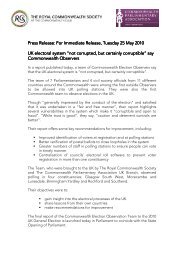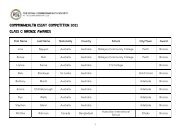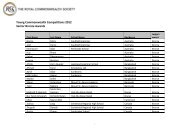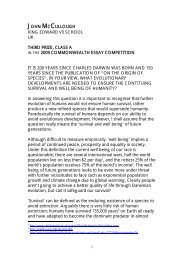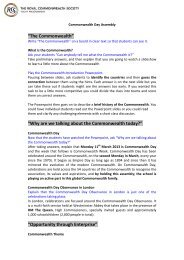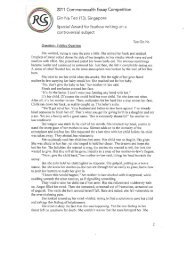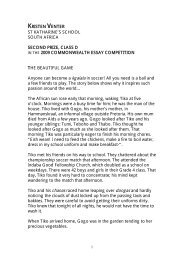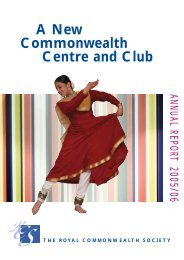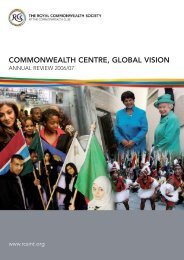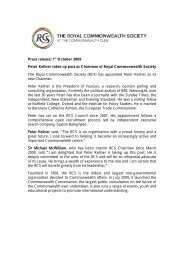Annual Review 2007-2008 - The Royal Commonwealth Society
Annual Review 2007-2008 - The Royal Commonwealth Society
Annual Review 2007-2008 - The Royal Commonwealth Society
You also want an ePaper? Increase the reach of your titles
YUMPU automatically turns print PDFs into web optimized ePapers that Google loves.
“I think that you can grow the economy,<br />
alleviate poverty, develop people’s skills<br />
and at the same time protect the<br />
environment. It’s not to see it as two<br />
separate things, but to actually work with<br />
people in using sustainable methods and<br />
renewable energy. <strong>The</strong>re are so many<br />
things that can be done by using<br />
sustainable methods, bringing people in<br />
[to the process] and bringing people up<br />
to the level that they aspire to.”<br />
Jacqueline van Meygaarden, on<br />
reconciling the rights of those living in<br />
developing countries to benefit from the<br />
advantages of industrialisation with the<br />
necessity of combating climate change.<br />
“Film-makers, writers, they’re seers -<br />
they can see the future. If you can see<br />
that the future is going to be bleak, you<br />
have a responsibility as a film-maker not<br />
to be dogmatic and say ‘this is what you<br />
should do!’, but to open up the<br />
possibility of dialogue between people.”<br />
‘Jaya’ Jayalakshmi on the role of the filmmaker.<br />
“This earth is all we have and know and<br />
anything we can do to make it a better<br />
place, we should.”<br />
‘Jaya’ Jayalakshmi on our collective<br />
responsibility to protect the planet.<br />
A young participant in Charlton<br />
Athletic Community Trust’s<br />
project, in the townships of<br />
Johannesburg, shakes hands<br />
with a South African<br />
policeman<br />
Khayelitsha rendez-vous<br />
<strong>2008</strong> has seen the beginnings of an<br />
exciting new partnership between the<br />
<strong>Royal</strong> <strong>Commonwealth</strong> <strong>Society</strong> and<br />
Charlton Athletic Community Trust<br />
(CACT). In 2002, CACT launched an<br />
innovative programme in several<br />
South African townships, called ‘Ikama<br />
lelethu – the future belongs to us’. <strong>The</strong><br />
aim of the project was to use football<br />
as a positive vehicle to steer young<br />
people away from crime and disorder.<br />
Over the course of the past five years,<br />
its reach and impact has expanded at<br />
a phenomenal rate. One of its most<br />
Martin Simons, Charlton Athletic Club<br />
recent expansions has been to the<br />
Chairman, with a <strong>Commonwealth</strong> Essay<br />
township of Khayelitsha, situated<br />
Competition participant in Johannesburg<br />
outside Cape Town. This very same<br />
township is depicted in Jacqueline van<br />
Meygaarden’s winning film entry ‘Free Energy’ and a team from CACT recently took<br />
copies of the film out to the township for use in their youth projects. <strong>The</strong> RCS looks<br />
forward to developing the exciting synergy which exists between the two organisations.<br />
For more information on the work of CACT please see the April edition of the<br />
RCS newsletter.<br />
Jacqueline’s next project is a full length<br />
documentary on sustainability and climate<br />
change in South Africa which will focus on<br />
the balance between economic growth,<br />
sustainability and climate change. Jaya<br />
will be making a feature film about a<br />
second generation British Indian girl who<br />
travels to India for the first time and is<br />
changed as a result of her encounter with<br />
a new culture.<br />
www.rcsint.org<br />
21



